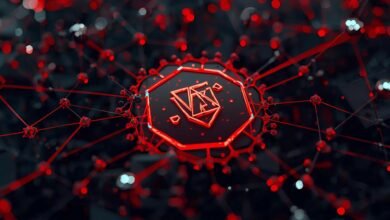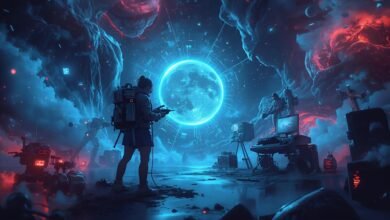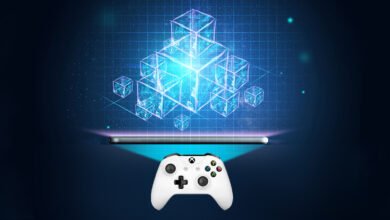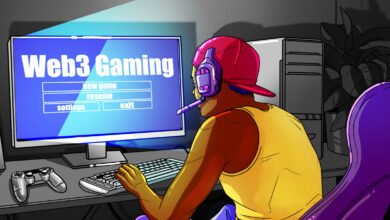5 Brilliant Web3 Gaming Innovations Revolutionizing 2025
Discover 5 groundbreaking Web3 gaming innovations transforming the industry in 2025. From AI-powered NPCs to cross-chain gaming, explore the future now!

The Web3 gaming Innovations industry has reached a pivotal moment in 2025, marking a significant departure from traditional gaming models that have dominated the entertainment sector for decades. This revolutionary transformation represents more than just technological advancement; it embodies a fundamental shift toward decentralized gaming ecosystems that prioritize player ownership, community governance, and economic empowerment.
Unlike conventional gaming platforms, where players invest countless hours and resources without retaining true ownership of their digital assets, blockchain gaming innovations are creating unprecedented opportunities for gamers to monetize their skills, creativity, and time investment. The integration of non-fungible tokens (NFTs), cryptocurrency rewards, and smart contracts has established a new paradigm where virtual achievements translate into real-world value.
The current landscape of Web3 gaming in 2025 showcases remarkable diversity in implementation approaches, ranging from fully decentralized autonomous gaming worlds to hybrid models that combine traditional gaming mechanics with blockchain technology. This evolution has been driven by significant improvements in blockchain scalability, user interface design, and mainstream adoption of digital wallets and cryptocurrency platforms.
Major gaming studios, independent developers, and technology giants have collectively invested billions of dollars into Web3 gaming infrastructure, recognizing the immense potential for creating sustainable, player-centric ecosystems.
The innovations emerging in 2025 are addressing previously identified challenges such as transaction costs, network congestion, and user experience complexity, making blockchain gaming more accessible to mainstream audiences while maintaining the core principles of decentralization and player ownership.
1. AI-Powered Dynamic NPCs and Procedural Content Generation
Revolutionary Character Intelligence Systems
The integration of artificial intelligence with blockchain gaming has produced one of the most significant innovations in Web3 gaming for 2025: truly intelligent non-player characters (NPCs) that evolve based on blockchain-recorded player interactions. These AI-powered NPCs utilize machine learning algorithms to analyze on-chain data, creating personalized gaming experiences that adapt to individual player behaviors and preferences.
Unlike traditional NPCs that follow predetermined scripts, these advanced characters possess memory systems stored on distributed ledgers, enabling them to remember past interactions across different gaming sessions and even different games within the same Web3 gaming ecosystem. This persistent memory creates unprecedented continuity in digital gaming experiences, where NPCs develop unique relationships with players over time.
Dynamic Content Creation and Asset Generation
Procedural content generation powered by AI algorithms is revolutionizing how Web3 gaming environments are created and maintained. These systems automatically generate new quests, storylines, and even entire game worlds based on community preferences and player behavior patterns recorded on the blockchain.
The decentralized nature of these content generation systems ensures that no single entity controls the creative direction of gaming worlds. Instead, smart contracts govern the parameters for content creation, allowing communities to vote on narrative directions and gameplay mechanics through decentralized autonomous organizations (DAOs).
This innovation has particularly benefited play-to-earn gaming models, where fresh content generation maintains player engagement and ensures sustainable cryptocurrency rewards distribution. The AI systems balance content difficulty and reward structures automatically, preventing inflation while maintaining exciting gameplay experiences.
2. Cross-Chain Gaming Ecosystems and Asset Portability
Universal Digital Asset Standards

One of the most transformative Web3 gaming innovations of 2025 is the development of universal standards for cross-chain gaming asset portability. These protocols enable players to transfer their NFT gaming assets, characters, and achievements seamlessly across different blockchain networks and gaming platforms.
The implementation of cross-chain bridges specifically designed for gaming protocols has eliminated the traditional silos that confined players to single gaming ecosystems. Players can now utilize their favorite weapons, characters, or cosmetic items across multiple games, regardless of the underlying blockchain infrastructure.
This interoperability has created a vibrant secondary market for digital gaming assets, where items gain value based on their utility across multiple gaming platforms. Rare weapons effective in various games command premium prices, while cosmetic items that enhance player identity across different virtual worlds have become highly sought-after collectibles.
Multi-Chain Gaming Identity Systems
Decentralized identity solutions have evolved to support comprehensive gaming profiles that span multiple blockchain networks. These identity systems aggregate player achievements, reputation scores, and asset ownership across various Web3 gaming platforms, creating portable gaming personas that persist beyond individual games.
The blockchain-based identity systems utilize zero-knowledge proofs to verify player achievements and skills without revealing sensitive personal information. This approach enhances privacy while enabling games to offer personalized experiences and appropriate challenge levels based on verified player capabilities.
3. Sustainable Play-to-Earn Economic Models
Balanced Tokenomics and Inflation Control
The play-to-earn gaming sector has matured significantly in 2025, with sophisticated economic models that address the sustainability challenges faced by earlier implementations. New tokenomics designs incorporate dynamic supply and demand mechanisms that automatically adjust cryptocurrency rewards based on player participation levels and economic health indicators.
These advanced gaming economies utilize algorithmic stablecoins and multi-token systems that separate utility tokens from governance tokens, creating more stable in-game economies. Players earn utility tokens for gameplay activities while governance tokens reward long-term community participation and ecosystem development.
The integration of decentralized finance (DeFi) protocols with Web3 gaming has created additional revenue streams for players through yield farming, liquidity provision, and staking mechanisms. These financial instruments are seamlessly integrated into gameplay, allowing players to optimize their earnings through strategic economic decisions.
Community-Driven Economic Governance
Decentralized gaming economies now feature sophisticated governance mechanisms where player communities actively participate in economic policy decisions. DAO governance systems enable players to vote on inflation rates, reward distribution mechanisms, and new economic features.
This community governance approach has proven effective in maintaining economic balance while ensuring that changes reflect the collective interests of the player base. The transparency of blockchain-based voting systems builds trust and encourages long-term player investment in gaming ecosystems.
4. Immersive Metaverse Integration and Virtual Land Ownership
Persistent Virtual World Economies
The metaverse gaming landscape has evolved dramatically in 2025, with virtual land ownership becoming a cornerstone of Web3 gaming innovation. These virtual real estate markets operate on blockchain technology, ensuring verifiable ownership and enabling complex economic interactions within persistent virtual worlds.
Virtual land parcels serve as foundations for player-created content, businesses, and social spaces. Landowners can monetize their properties through various mechanisms, including renting space to other players, hosting events, or developing commercial ventures that generate ongoing cryptocurrency rewards.
The metaverse integration extends beyond simple land ownership to encompass entire virtual economies where players can establish businesses, create and sell digital goods, and provide services to other community members. These activities are governed by smart contracts that ensure transparent and automated transaction processing.
Social Gaming and Community Building
Web3 gaming platforms have prioritized social interaction and community building through innovative decentralized social networks integrated directly into gaming experiences. These social systems enable players to form lasting relationships that extend beyond individual games, fostering vibrant gaming communities.
The blockchain-based social features include reputation systems, achievement sharing, and collaborative gameplay mechanics that reward teamwork and community contribution. Players can showcase their accomplishments across their entire Web3 gaming journey, building personal brands within the broader gaming ecosystem.
5. Enhanced Security and True Digital Ownership
Advanced Cryptographic Asset Protection

Web3 gaming security has reached new heights in 2025 with the implementation of advanced cryptographic protocols that protect player assets and prevent unauthorized access. Multi-signature wallets, hardware security modules, and biometric authentication systems provide multiple layers of protection for valuable NFT gaming assets.
The decentralized nature of asset storage ensures that no single point of failure can compromise player ownership rights. Smart contracts governing asset ownership are audited by independent security firms and operate on battle-tested blockchain networks with proven security records.
Transparent and Immutable Game Mechanics
Blockchain gaming now features completely transparent game mechanics where all random number generation, drop rates, and reward calculations are verifiable on-chain. This transparency eliminates concerns about unfair practices and builds trust between players and game developers.
The immutable nature of blockchain records ensures that game rules cannot be arbitrarily changed without community consensus. This stability provides players with confidence in long-term investment decisions and strategic planning within Web3 gaming ecosystems.
For More: Web3 Gaming Sees 386% Growth, Redefining Player Experience
Conclusion
The Web3 gaming innovations emerging in 2025 represent a fundamental transformation of the digital entertainment industry, moving beyond traditional models toward truly decentralized gaming ecosystems that prioritize player empowerment and community ownership. These revolutionary developments in blockchain gaming are creating unprecedented opportunities for players to derive real-world value from their gaming activities while maintaining the entertainment and social aspects that make gaming enjoyable.
The convergence of artificial intelligence, cross-chain interoperability, sustainable play-to-earn models, metaverse integration, and enhanced security measures is establishing a robust foundation for the future of digital entertainment. As these technologies continue to mature and mainstream adoption accelerates, Web3 gaming is positioned to become the dominant paradigm for interactive digital experiences.
The success of these innovations depends on continued collaboration between developers, players, and blockchain technology providers to address scalability challenges and improve user experience. The gaming industry’s commitment to decentralization principles, while Web3 Gaming Innovations maintains high-quality entertainment value will determine the long-term impact of these transformative technologies.




